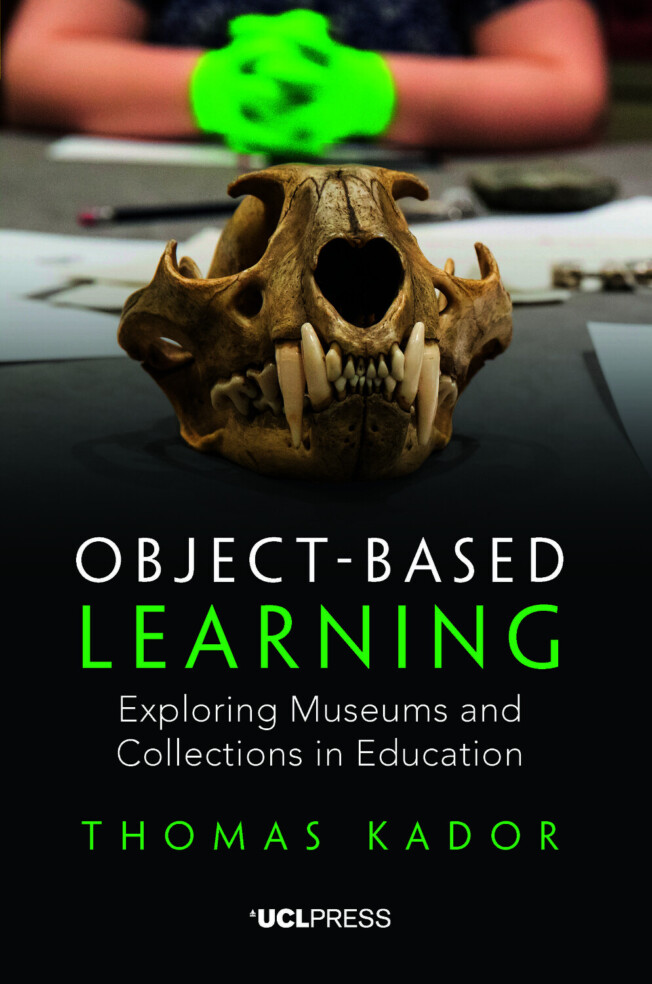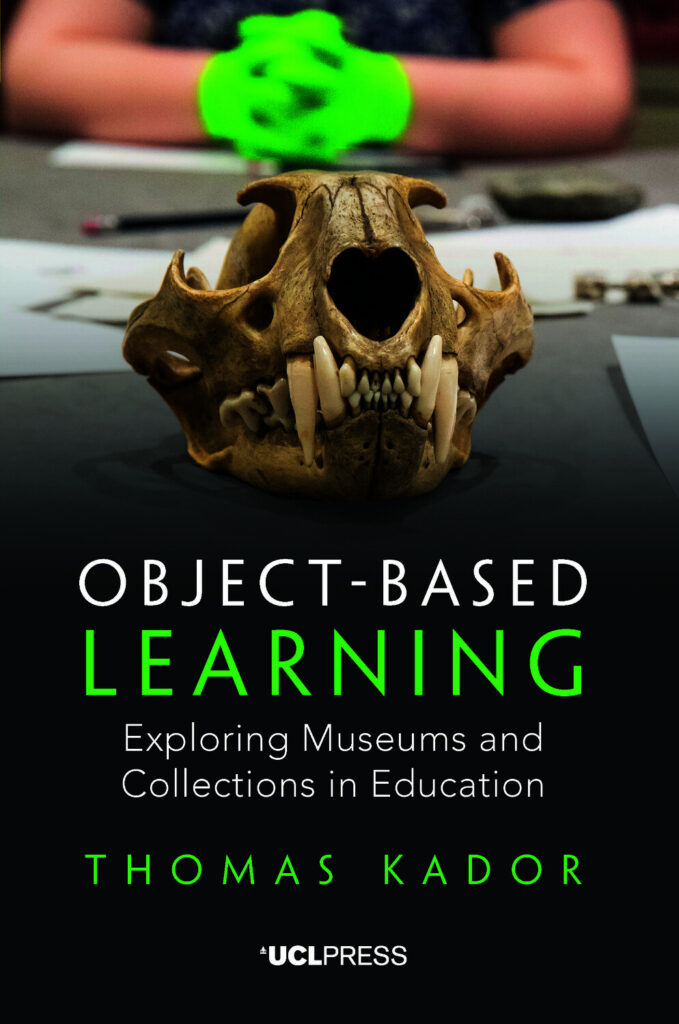
Object-Based Learning
Exploring museums and collections in education
Thomas Kador (Author)
Object-Based Learning provides a concise overview of some of the most important approaches to material culture and object analysis in plain and easily understandable language, that is equally accessible to undergraduate and postgraduate students as well as lecturers.
The textbook is organised in a clear and easy-to-follow way, each chapter is filled with practical case studies, exercises and several diagrams to illustrate important arguments and approaches. The succinct and practically focused discussion of the main issues relating to exhibiting objects and curatorial practice, brings together diverse but complementary topics such as the history of collecting, understanding audiences, accessibility, digital media, technologies and ethics.
Each chapter includes learning objectives, questions and exercise boxes, case studies and further readings and resources.
List of figures List of tables List of boxes, case studies and exercises How to use this book
Acknowledgements
Part I: Objects, collections and collecting
1 Learning with things: an introduction to object-based learning
2 Collecting, collections and collectors
3 Objects, collections, and the colonial legacy
Part II: Understanding and analysing objects and materials
4 Materials and material culture
5 Making, growing and the operational sequence
6 Object biographies and the social life of things
7 The psychosocial dimension of material culture
Part III: Exhibiting and communicating with objects
8 Communicating through exhibitions
9 Digital technology in researching and exhibiting objects
10 Exhibition ethics
Conclusions: Learning with things, teaching with things and the future of object-based learning
Index
DOI: 10.14324/111.9781787354296
Publication date: 04 September 2025
PDF ISBN: 9781787354296
EPUB ISBN: 9781787354326
Hardback ISBN: 9781787354319
Paperback ISBN: 9781787354302
Thomas Kador (Author)
Thomas Kador is Associate Professor in Creative Health at UCL Arts & Sciences, where he leads the Masters (MASc) in Creative Health programme and for the past decade has led UCL’s flagship Object Lessons module. He has published widely on object-based learning, student wellbeing and experiential learning spaces, has been instrumental in delivering UCL's Object-based Learning Laboratory and in developing the world's first MASc in Creative Health postgraduate taught programme. He is a senior fellow of the Higher Education Academy and Co-Editor in chief of the Journal of Community Archaeology and Heritage.
‘This textbook is a rich and timely resource that weaves together important context, clear definitions of key concepts, theoretical insights and ethical considerations with practical examples, exercises and case studies to explore the place of objects – and indeed museums – in an increasingly digitised world, and the value, the risks and the opportunities of their close and embodied study. For students, educators and practitioners, or those just interested to know more about how we can understand the world and ourselves through material things, this book is an invaluable reference. And it’s a good read.’
Dr Jennifer Blunden, Industry Fellow (Museums), University of Technology Sydney
‘Object-Based Learning is an invaluable resource for anyone engaging with material culture. The textbook bridges theory and practice for object analysis in an accessible manner, and guides readers through essential topics such as the history of collecting, colonial legacies, curatorial ethics, digital technologies, and audience engagement. The thoughtful structure supports both modular use and comprehensive engagement, with each chapter presenting rich case studies, reflective exercises, and critical questions that prompt deeper analysis and classroom discussion. For students and educators alike, this book offers a flexible and adaptable toolkit for learning – and teaching – with things.’
Dr Nuala Morse, Associate Professor in Museum Studies, University of Leicester
‘A must-read for anyone with an interest in teaching and learning in universities and museums. Delivered in an invitingly warm and conversational style, this important textbook provides a rigorous treatment of its subject – the relatively new pedagogy of object-based education for adult learners. Offering an excellent blend of contextual, theoretical and practical information, and drawing on fascinating examples from UCL’s museums and collections, what emerges is encompassing and illuminating; thoughtful and timely. Thomas Kador has achieved a rare thing: a volume both wide and deep in scope, which remains accessible and engaging for all readers.’
Leonie Hannan, Reader in History, Queen’s University Belfast
‘This is an invaluable resource for novice and expert alike, providing all the tools necessary to engage with objects, in classrooms, exhibitions, and beyond. With accessible summaries of key concepts and theoretical debates, in addition to suggested further reading for every chapter, students from a wide range of backgrounds will be able to dive in and develop their skills and knowledge as far as their interest takes them. An absolutely indispensable distillation of Kador’s vast experience and expertise, as well as a rich source of inspiration for those already working with collections and anyone aspiring to.’
Manon S. Parry, Professor of Medical History, Vrije Universiteit
Related titles
Object-Based Learning
Exploring museums and collections in education
Object-Based Learning provides a concise overview of some of the most important approaches to material culture and object analysis in plain and easily understandable language, that is equally accessible to undergraduate and postgraduate students as well as lecturers.
The textbook is organised in a clear and easy-to-follow way, each chapter is filled with practical case studies, exercises and several diagrams to illustrate important arguments and approaches. The succinct and practically focused discussion of the main issues relating to exhibiting objects and curatorial practice, brings together diverse but complementary topics such as the history of collecting, understanding audiences, accessibility, digital media, technologies and ethics.
Each chapter includes learning objectives, questions and exercise boxes, case studies and further readings and resources.
‘This textbook is a rich and timely resource that weaves together important context, clear definitions of key concepts, theoretical insights and ethical considerations with practical examples, exercises and case studies to explore the place of objects – and indeed museums – in an increasingly digitised world, and the value, the risks and the opportunities of their close and embodied study. For students, educators and practitioners, or those just interested to know more about how we can understand the world and ourselves through material things, this book is an invaluable reference. And it’s a good read.’
Dr Jennifer Blunden, Industry Fellow (Museums), University of Technology Sydney
‘Object-Based Learning is an invaluable resource for anyone engaging with material culture. The textbook bridges theory and practice for object analysis in an accessible manner, and guides readers through essential topics such as the history of collecting, colonial legacies, curatorial ethics, digital technologies, and audience engagement. The thoughtful structure supports both modular use and comprehensive engagement, with each chapter presenting rich case studies, reflective exercises, and critical questions that prompt deeper analysis and classroom discussion. For students and educators alike, this book offers a flexible and adaptable toolkit for learning – and teaching – with things.’
Dr Nuala Morse, Associate Professor in Museum Studies, University of Leicester
‘A must-read for anyone with an interest in teaching and learning in universities and museums. Delivered in an invitingly warm and conversational style, this important textbook provides a rigorous treatment of its subject – the relatively new pedagogy of object-based education for adult learners. Offering an excellent blend of contextual, theoretical and practical information, and drawing on fascinating examples from UCL’s museums and collections, what emerges is encompassing and illuminating; thoughtful and timely. Thomas Kador has achieved a rare thing: a volume both wide and deep in scope, which remains accessible and engaging for all readers.’
Leonie Hannan, Reader in History, Queen’s University Belfast
‘This is an invaluable resource for novice and expert alike, providing all the tools necessary to engage with objects, in classrooms, exhibitions, and beyond. With accessible summaries of key concepts and theoretical debates, in addition to suggested further reading for every chapter, students from a wide range of backgrounds will be able to dive in and develop their skills and knowledge as far as their interest takes them. An absolutely indispensable distillation of Kador’s vast experience and expertise, as well as a rich source of inspiration for those already working with collections and anyone aspiring to.’
Manon S. Parry, Professor of Medical History, Vrije Universiteit

